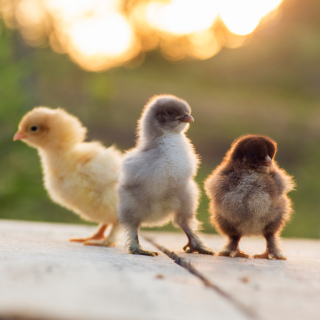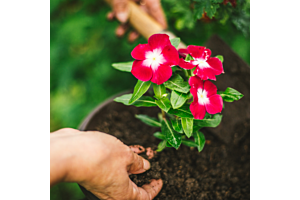Flock Yeah! A Beginner’s Guide to Raising Backyard Chickens

Getting Started with Backyard Chickens
By: Katie Bigley
With egg prices soaring, many are turning to backyard chickens as a sustainable solution. Raising chickens is more than just collecting eggs, it’s a big commitment! I’ve teamed up with Leon Obert, the store manager of the Quincy Farm & Home Supply, to help provide some useful information for the first-time chick owner.
Initial Supplies and Costs – If you are considering owning chicks, it’s important to understand the cost associated with raising chickens and familiarize yourself with the initial supplies you will need before bringing them home.
Some essential supplies you will need are a brooder (an enclosure to house the chicks indoors), a heat lamp, bedding, feeders and waterers, and of course, chick feed. “Getting initially started, it’s probably going to be around $100 worth of supplies,” says Leon.
That is just the cost of getting started. As the chicks grow up into chickens, you will need to either purchase a pre-made coop or maybe you plan to build one yourself. Adult chickens will also require larger feeders and waterers and more feed. It’s important to educate yourself on the initial and ongoing costs of chicken ownership before bringing your feathered friends home.
Thankfully, Farm & Home Supply has everything you need throughout the entire life of your chickens. Staff are more than happy to help guide you along when it comes to the appropriate supplies and feed as your chicks grow up into chickens – Shop now!
Bringing Your Chicks Home – Before you bring your chicks home, be sure to have your brooder set up and ready to go with bedding, feeders, and waterers. Make sure the heat lamp is on, so you can ensure the brooder is at the appropriate temperature before bringing the chicks home. “You want to start giving them some electrolytes in their water for the first hour of bringing them home before you start giving them their chick starter feed,” says Leon.
Why are electrolytes important? Electrolytes are needed for chicks as they can quickly become dehydrated from factors like stress from shipping, changes in environments, or illness.
Allowing the chicks to adjust to their new home with minimal handling the first few days is a good way to keep their stress levels down. Be sure to observe their behavior to make sure they are comfortable (not too hot or cold) and that they have found their water source.
Heat Lamps - Heat lamps are a necessity if you decide to raise chicks of your own. Because newly hatched chicks cannot maintain a stable body temperature on their own, they rely on external heat sources like heat lamp to stay warm. But how do you know if you are using the heat lamp effectively for your chicks?
When you first bring your chicks home, the ideal temperature to keep your brooder is around 95 degrees. Toasty right? “If your chicks are getting away from the light and not laying underneath the light, that means they are getting too warm,” says Leon. In this case, you would want to raise the lamp a little bit to decrease the temperature. “If they are huddled all together under the lamp, that means they are getting too cold,” adds Leon. This means you probably need to lower the lamp a little bit more into the brooder to help increase that temperature.
How long do my chicks need the heat lamp? Leon’s advice is to gradually lower the temperature of the lamp by about 5 degrees per week. “About the sixth week, right before you’re ready to take them out of the brooder, you should be at about 70 degrees,” says Leon. This gradual decrease in temperature helps chicks acclimate to the ambient temperature of their environment and prepares them for life outdoors in the coop.
Transitioning to an Outdoor Coop – By the fifth or sixth week of owning your chicks, you should be looking into transitioning them to their outdoor coop. “You want your outdoor temperature to be about 70 degrees consistently before you actually move your birds out into the elements of the outdoor coop,” says Leon. By this time, your chicks should have grown significantly and developed more feathers to help them retain body heat more efficiently and tolerate cooler weather.
How big of a coop do I need? When it’s time to make the jump from your indoor brooder to an outdoor coop, you may be wondering if you have a large enough space for your flock. “Two cubic feet is what they recommend per bird,” says Leon. Making sure you have ample space for each of your chickens is important for their well-being. Having a large enough coop for your flock can help reduce social stress as overcrowding can cause chickens to become territorial and aggressive. An appropriate coop size can also help keep disease risk low as close proximity allows for easier transmission of bacteria, viruses, and parasites.
How Many Chickens? How Many Eggs? – A big question you might have before you decide to have your backyard chickens, is how many should you plan to purchase. This greatly depends on the size of your family and your demand for eggs. “For a family of four, you should have between four to six chicks,” says Leon. “You’ll probably get an egg per day for the first couple years of the hen’s life, the normal hen will live to be about 8 years old,” he adds.
When will my chickens start laying eggs? Chickens won’t begin to lay eggs until they are about five to six months old. “This can vary a little bit between different breeds, but five to six months is a general rule of thumb,” says Leon.
Advice - Leon’s biggest piece of advice for first-time chick owners is to do research and make sure you prepare yourself with the proper knowledge before bringing your chicks home. Remember, a chicken can live up to eight years! That is quite a commitment, and young chicks require more time and attention.
Owning chickens is a unique experience that offers a sense of self-sufficiency. Just remember that careful planning and consistent care are key to a successful and rewarding experience. Be sure to educate yourself on different topics like feeding and nutrition, egg production and factors that may affect it, health and disease prevention, and the ongoing costs and time commitments of having your flock! Being as educated as possible will ensure you have a happy, healthy flock!
Thank you, Leon, for helping with this blog!





